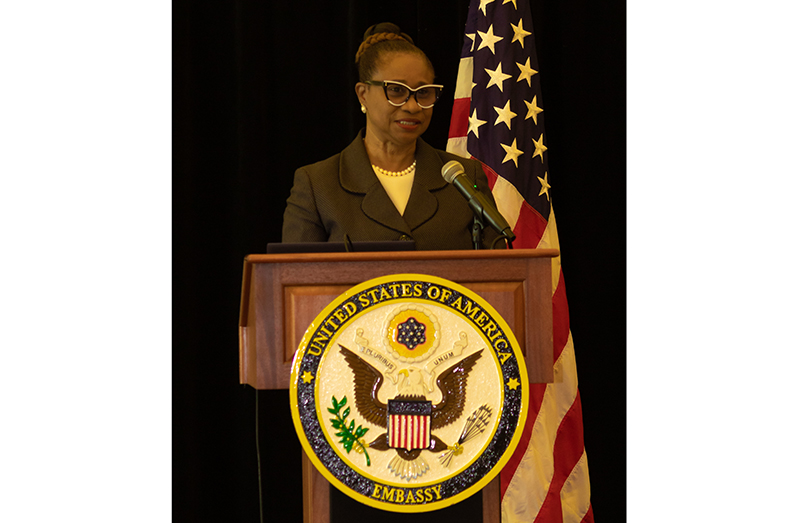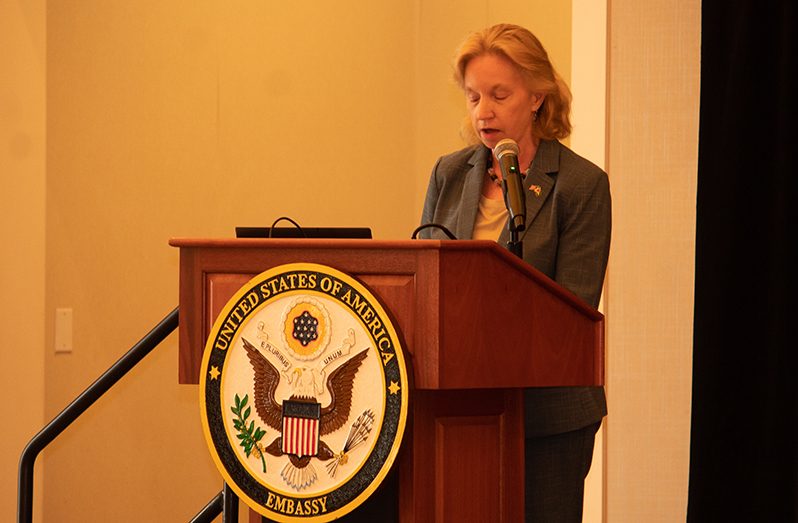–related legislative framework necessary in order to seize assets that are proceeds of crime
WITH Guyana’s current economic growth, particularly in its burgeoning oil and gas sector, it is crucial for judicial officers to stay up to date with the latest best practices on asset recovery and civil forfeiture to ensure proper adjudication of cases related to these matters.
This was according to Chancellor of the Judiciary, Yonette Cummings-Edwards, who was addressing the opening of the two-day “Judicial Asset Recovery Conference” at the Marriott Hotel in Georgetown on Monday.
“We were told growing up that crime does not pay and the proceeds of crime, the ill-gotten gains, are only for a time. And this is so because the state and the law-enforcement agencies will come after those elements who tried to get rich by criminal means and to get their assets,” the Chancellor said.
She added that the goal of the conference is to engage members of the judiciary in the area of asset recovery, building knowledge, and sharing best practices in conviction-based and non-conviction-based asset recovery.
“It’s no secret that Guyana has experienced an economic boom, or we’ve been on that trajectory. And with that, that development and the type and magnitude of such development is historic.
“The spin-off oil and gas and its related industries, and the challenges and legal issues associated with such economic development are well known. The judiciary of Guyana must meet those challenges legally and we must be above par in dealing with those issues,” Justice Cummings-Edwards said.
She encouraged the judicial officers to view the conference as an opportunity to build and enhance their capacity, and to develop key strategies for combatting asset recovery and civil forfeiture.
Also speaking at the event was the United States (US) Ambassador Sarah-Ann Lynch, who said that the conference will be an avenue for “an understanding of trends, discussing typical relevant issues, exploring new methods of solving problems….”
She said that the conference is aimed at advancing capacity within the judiciary of Guyana to further promote timely and reasoned adjudication on asset recovery.
“Asset Recovery legislative frameworks are critical to taking the profit from crime. While we understand the challenge of reform, we encourage counterparts to update existing legislation to give judicial officers the best possible framework through which to adjudicate these cases.

“…This conference is well timed, as it comes in the midst of Guyana’s rapid economic transformation. It brings together regional partners to enhance knowledge of the law and share local, regional, and international best practices that will help build expertise in areas of conviction-based and non-conviction-based asset recovery in Guyana,” the US Ambassador said.
Currently, both the Anti-Money Laundering and Countering the Financing of Terrorism (AML/CFT) and Narcotic Drugs and Psychotropic Substances (Control) Act have provisions for asset recovery and civil forfeiture.
Asset recovery and civil forfeiture are legal processes used by governments to seize assets that are suspected to be the proceeds of crime, in order to prevent criminals from profiting from their illegal activities.
Asset recovery refers to the process of recovering assets that were obtained through illegal means, while civil forfeiture allows governments to seize assets, even if the owner has not been convicted of a crime, if there is evidence that the assets were obtained through illegal means.
The attendees, consisting of Judges, Magistrates, Commissioners of Titles, State Prosecutors, and Registrars, will get to interact with expert faculty including Hon. Chief Justice of Belize, the Justice of Appeal from the Supreme Court of Jamaica, High Court Judges from the Eastern Caribbean Supreme Court, and the Judiciary of Trinidad and Tobago, among others.
The conference was made possible by the National Center for State Courts (NCSC), which partnered with the Judicial Education Institute of Guyana, in recognition of the increased collaboration between the Government of Guyana and the Government of the United States of America on security, rule of law, and countering organised crime.



.jpg)








